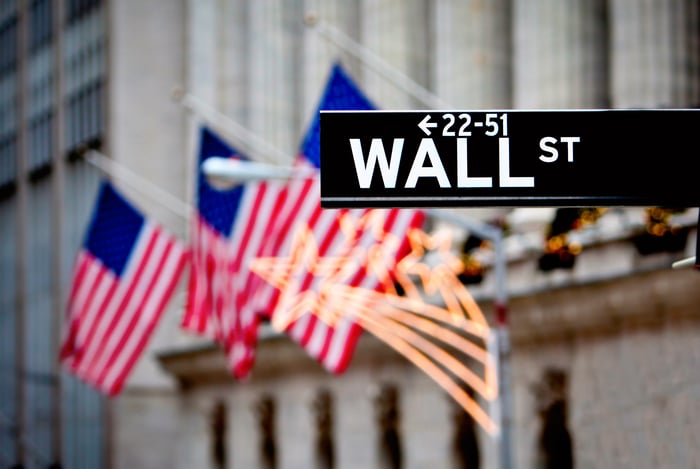|
|
|

|
|||||

|
|
Investors have witnessed numerous changes to the Dow Jones since its inception in 1896.
Verizon's low share price, which combined with the poor performance of its stock over the last decade, makes it a logical candidate to be removed from the index.
Three brand-name businesses with high share prices and diverse industry representation would make for smart replacements of Verizon in the Dow.
In May, the iconic Dow Jones Industrial Average (DJINDICES: ^DJI) celebrated its 129th "birthday" since its official inception. Over this time, we've witnessed the Dow blossom from an industrial stock-dominated 12-component index to one that now houses 30 diverse, time-tested, multinational businesses.
Although the Dow Jones is still viewed as a barometer of Wall Street's health, it's not nearly as encompassing as the benchmark S&P 500, which consists of 500 companies.
Where to invest $1,000 right now? Our analyst team just revealed what they believe are the 10 best stocks to buy right now. Learn More »

Image source: Getty Images.
The Dow also has an inherent flaw, which has encouraged changes to the index over the last century. Whereas the S&P 500 and Nasdaq Composite are market cap-weighted indexes (i.e., companies with higher market valuations bear more weight within the index), the Dow Jones Industrial Average is entirely a share price-weighted index. In other words, the higher a component's share price, the more influence it holds within the Dow.
For example, somewhat recent addition Sherwin-Williams closed the July 3 trading session at $354 per share. In comparison, Nvidia ended the session at $159.34 per share. Even though Nvidia's $3.89 trillion market cap is nearly 44 times greater than the market value of Sherwin-Williams, the latter has more than twice as much influence within the Dow.
Being the low stock on the Dow Jones Industrial Average's totem pole, in terms of share price, is a dangerous place to be -- and it's a position currently occupied by telecom titan Verizon Communications (NYSE: VZ).
The committee responsible for making changes to this ageless index tend to focus on three factors: share price, performance, and representation. They want companies that will influence the Dow, add value to the Dow Jones over time, and are representative of industries that bear importance to the American and/or global economy.
Although Verizon is still a very important provider of wireless services, broadband, and streaming content, it's not exactly on the leading edge of innovation like it once was.
More importantly, its $43.55 share price doesn't exert much influence within the Dow. Based on the Dow divisor (as of November 2024), each share price dollar equates to about 6.15 Dow points. Verizon is currently responsible for less than 268 out of the Dow's 44,829 points.
The other issue for Verizon is that its shares have declined in value by 8% over the trailing decade (not including dividends). The committee prefers to pack the Dow with companies that'll help lift the index over time. Verizon hasn't demonstrated that it can do that.
Even though Verizon is historically inexpensive amid a pricey stock market, and the company is enjoying low wireless churn rates and a resurgence in organic growth thanks to broadband signups, it's days as a Dow Jones Industrial Average component are likely numbered.
What follows are three logical candidates that can, eventually, take its place.

Image source: Getty Images.
Perhaps the best replacement for Verizon, should it be shelved from the Dow, is Google parent Alphabet (NASDAQ: GOOGL)(NASDAQ: GOOG).
Prior to mid-2022, Alphabet had virtually no chance of being included in the Dow because of its four-digit share price. But thanks to a 20-for-1 forward split in July 2022, Alphabet's current share price of nearly $180 would fit right into the heart of the Dow's 30 components.
Alphabet would also bring relevance from a host of industries into the Dow. It has a near-monopoly like share of global internet search through Google, and streaming service YouTube is the second most-visited social media destination. Further, Google Cloud is the world's No. 3 cloud infrastructure service platform by total spend, while Waymo is an up-and-coming ride-share provider. Alphabet would offer a read on the health of the advertising economy, as well as cloud and artificial intelligence (AI) spending.
To add fuel to the fire, Alphabet has been a top-tier performer for quite some time. Its Class A shares (GOOGL) are up 65% over the trailing-three-year period and 556% over the trailing decade.
Though it isn't a one-for-one replacement of Verizon's telecom services, Alphabet's strong advertising roots, along with its ownership of streaming platform YouTube, would offer some similarities.
The second logical candidate to take Verizon's place in the Dow Jones Industrial Average is social media behemoth Meta Platforms (NASDAQ: META). Meta is the company behind popular social media platforms Facebook, WhatsApp, Instagram, Threads, and Facebook Messenger.
Arguably the only knock against Meta is its current share price, which tipped the scales at roughly $719, as of the closing bell on July 3. Meta is the only member of the "Magnificent Seven" to have never split its stock. Though triple-digit share prices seem to be preferred within the Dow, Meta would be responsible for almost 10% the value of the ageless index based on its current share price. A stock split may be needed before Meta is given serious consideration for addition to the Dow.
However, Meta Platforms absolutely has the pedigree for admission. It generates close to 98% of its revenue from advertising on its social media platforms. While Dow components Amazon, Walt Disney, and Verizon provide glimpses of the health of the advertising industry, Meta would offer a crystal-clear view of advertising demand.
Meta's stock has also handily outperformed the benchmark stock indexes over extended periods. Shares of the company have surged 349% over the trailing-three-year period, and are higher by a cool 724% over the trailing decade. While these figures are unlikely to be duplicated over the next 10 years, Meta's cash-rich balance sheet, sustainable social media moat, and its AI/metaverse ambitions, all suggest it's still firmly in a growth phase.
A third and final candidate that would make for a logical replacement of Verizon in the Dow Jones Industrial Average is rival T-Mobile (NASDAQ: TMUS).
Shifting from Verizon to T-Mobile would effectively be a lateral move that ensures the Dow maintains telecom service representation. But in making this proposed switch, a stock with a $43.55 share price would be removed in favor of one with a $240.75 share price. T-Mobile would have the ability to exert influence on the Dow, whereas Verizon is a complete afterthought.
T-Mobile brings outperformance to the table, as well. Shares of the company have climbed 76% over the last three years, and they're up a scorching-hot 518% over the trailing decade. Even though past performance isn't a guarantee of future results, T-Mobile has been sporting a consistently higher growth rate than legacy telecom providers Verizon and AT&T, the latter of which was kicked out of the Dow in 2015.
Similar to Verizon, T-Mobile's growth has been hitched to the 5G revolution and a surge in consumers and businesses wanting to upgrade their broadband service. Where T-Mobile has really stood out is its ability to dominate in small markets and rural areas where 5G coverage is still being expanded. These smaller markets are helping to sustain a mid-to-high single-digit annual growth rate, which is typically double what legacy telecom companies AT&T and Verizon have delivered.
Before you buy stock in Verizon Communications, consider this:
The Motley Fool Stock Advisor analyst team just identified what they believe are the 10 best stocks for investors to buy now… and Verizon Communications wasn’t one of them. The 10 stocks that made the cut could produce monster returns in the coming years.
Consider when Netflix made this list on December 17, 2004... if you invested $1,000 at the time of our recommendation, you’d have $695,481!* Or when Nvidia made this list on April 15, 2005... if you invested $1,000 at the time of our recommendation, you’d have $969,935!*
Now, it’s worth noting Stock Advisor’s total average return is 1,053% — a market-crushing outperformance compared to 179% for the S&P 500. Don’t miss out on the latest top 10 list, available when you join Stock Advisor.
*Stock Advisor returns as of July 7, 2025
John Mackey, former CEO of Whole Foods Market, an Amazon subsidiary, is a member of The Motley Fool's board of directors. Suzanne Frey, an executive at Alphabet, is a member of The Motley Fool's board of directors. Randi Zuckerberg, a former director of market development and spokeswoman for Facebook and sister to Meta Platforms CEO Mark Zuckerberg, is a member of The Motley Fool's board of directors. Sean Williams has positions in AT&T, Alphabet, Amazon, and Meta Platforms. The Motley Fool has positions in and recommends Alphabet, Amazon, Meta Platforms, Nvidia, and Walt Disney. The Motley Fool recommends Sherwin-Williams, T-Mobile US, and Verizon Communications. The Motley Fool has a disclosure policy.
| 17 min | |
| 18 min | |
| 36 min | |
| 40 min | |
| 47 min | |
| 52 min | |
| 57 min | |
| 1 hour | |
| 1 hour |
Mark Zuckerberg Grilled on Usage Goals, Underage Users at California Trial
META
The Wall Street Journal
|
| 1 hour | |
| 1 hour | |
| 1 hour | |
| 1 hour | |
| 1 hour | |
| 1 hour |
Join thousands of traders who make more informed decisions with our premium features. Real-time quotes, advanced visualizations, backtesting, and much more.
Learn more about FINVIZ*Elite